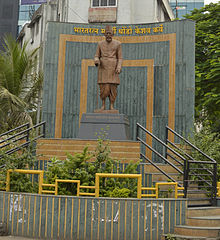Maharshi Dhondo Keshav Karve
| Dhondo Keshav Karve | |
|---|---|
 |
|
| Born |
18 April 1858 Sheravali, Dapoli, Dapoli, Ratnagiri, Maharashtra |
| Died | 9 November 1962 (aged 104) Pune, India |
Dr. Dhondo Keshav Karve (18 April 1858 – 9 November 1962), popularly known as Maharishi Karve, was a social reformer in India in the field of women's welfare. In honour of Karve, Queen's Road in Mumbai (Bombay) was renamed to Maharshi Karve Road.
Karve continued the pioneering work in promoting widows' education. The Government of India awarded him its highest civilian award, the Bharat Ratna, in 1958, the year of his 100th birthday.
The appellation Maharshi, which the Indian public often assigned to Karve, means ”a great sage”. He was also sometimes affectionately called "Annā Karve"; in the Marāthi-speaking community to which Karve belonged, the appellation "Annā" is often used to address either one's father or an elder brother.
During 1891–1914, Karve taught mathematics at Fergusson College in Pune, Maharashtra.
The work of Pandita Ramabai inspired Karve to dedicate his life to the cause of female education, and the work of Vishnushastri Chiplunkar and Iswar Chandra Vidyasagar inspired him to work for uplifting the status of widows. The writings of Herbert Spencer also highly influenced him.
When Karve had started his shelter and school for widows, in 1896, he had to start it in the remote village of Hingane outside the city of Pune because the dominant orthodox Brahmin community in the city had ostracized him for his reformatory activities. (Karve himself belonged to the Brahmin community.) With his meager resources, for many years Karve would walk several miles from Hingane to the city of Pune to teach mathematics at Fergusson College and also collect in his spare time paltry donations from a few progressive donors, even as some others from the orthodox community would openly hurl insulting epithets at him when he went around to spread the word of his emancipatory work and collect donations.
...
Wikipedia
